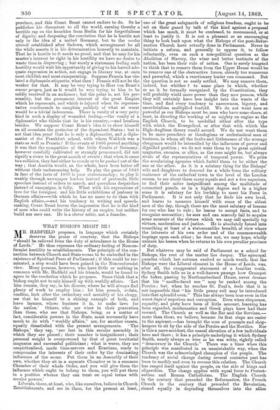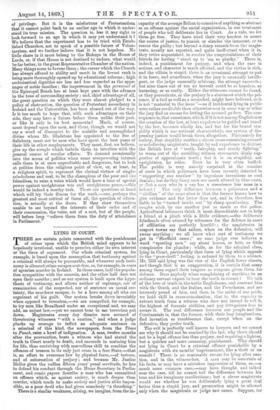WHAT BISHOPS MIGHT BE ?
MR. HADFIELD proposes, in language which certainly deserves the praise of courtesy, that the Bishops "should be relieved from the duty of attendance in the House of Lords." He thus expresses the ordinary feeling of Noncon- formist hostility to establishments. The principle of the con- nection between Church and State seems to be embodied in the existence of Spiritual Peers of Parliament ; if this could be ter- minated, a step would have been gained in the Nonconformist view. Many persons, however, who have little or nothing in common with Mr. Hadfield and his friends, would be found to agree in the resolution which he proposes. Some think that a bishop ought not to mix himself up with worldly affairs. Let him remain, they say, in his diocese, where he will always find plenty of work to employ him ; let him preach, cadain, confirm, look after the orthodoxy and morality of his clergy, see that he himself be a shining example of both, and leave laymen, whose business it is, to make laws for the nation.' Others, who are wiser in their generation than these, who see that Bishops, being, as a matter of fact, considerable powers in the State, must necessarily have much to do with "worldly affairs," are, for another reason, equally dissatisfied with the present arrangements. The Bishops,' they say, 'are lost in this secular assembly in which they are placed ; their number is insignificant; their personal weight is overpowered by that of great territorial magnates and successful politicians ; what is worse, they are unspiritualized, made time-servers and Erastians, ready to compromise the interests of their order by the dominating influences of the scene. Put them in an Assembly of their own, whether they sit in a separate Chamber or in a common Chamber of their whole Order, and you will give them the influence which ought to belong to them, you will put them in a position whence they can treat on equal terms with secular powers.'
Liberals, those, at least, who, like ourselves, believe in Church Establishments, and see in them, for the present at least, one of the great safeguards of religious freedom, ought to be set on their guard by talk of this kind against a proposal which has much, it must be confessed, to recommend, or at least to justify it. It is not a pleasant or an encouraging thing to look back upon what the Bishops of the post-Refor- mation Church have actually done in Parliament. Never to
initiate a reform, and generally to oppose it, to follow reluctantly, even on such a non-political question as the Abolition of Slavery, the wiser and better instincts of the nation, has been their rule of action. One is sorely tempted to think that to remove them from the Upper House would be to remove one of the obstructive forces, already too numerous• and powerful, which a reactionary leader can command. But the question is not so easily settled. We may remove them, indeed, but whither to some place in which, whether-
or no it be formally recognized by the Constitution, they will probably wield more power than they now possess, while they will certainly have less insight into the wants of the-
time, and find every tendency to narrowness, bigotry, and sacerdotalism multiplied tenfold. We do not want men so,
powerful as our Bishops must be, men who have some share, at least, in directing the working of so mighty an engine as the English Church, to be modelled either after the type with which the Evangelical, or after that with which the High-Anglican theory would accord. We do not want them. to be mere preachers or theologians or ecclesiastical men of business, in whom all the faults and littlenesses of the average clergyman would be intensified by the influences of power and dignified position ; we do not want them to be great spiritual magnates, enemies, or allies, as the case might be, but always rivals of the representatives of temporal power. We prize the secularizing agencies which forbid them to be either the one or the other. As it is a salutary thing for the Bishops' wife and daughters to descend for a while from the solitary eminence of the cathedral town to the level of the Londom season, to see about them many equals and not a few superiors, to find their mitre insignificant among the multitude of coronetted panels, so in a higher degree and in a higher sense it is salutary for his lordship to meet his Peers in.
Parliament. It is not only that he finds his own level, and learns to measure himself with some of the ablest men of the day, though these are the most salutary of lessons for one who has to rule ; he learns to accept facts, and to recognize necessities ; he sees and can scarcely fail to acquire some measure of the virtues which we may call specially lay
virtues, moderation and justice. He is absolutely forced into
at least of a statesmanlike breadth of view where the interests of his own order and of the commonwealth: impinge upon each other ; he does not, we may hope, wholly unlearn his lesson when he returns to his own peculiar province, of duty.
But whatever may be said of Parliament as a school for Bishops, the root of the matter lies deeper. The episcopal.
paradox which last autumn excited so much wrath, that the Bishops were the Liberal element in the House of Lords, was, after all, the exaggerated statement of a familiar truth.
Sydney Smith tells us in a well-known passage how Crumpet the baker, passing by Northumberland House, never dreams, that his " muffin-faced son " may be ranked among the Percies ; but, when he reaches St. Paul's, feels that it is not impossible that "his little penny roll may be introduced into that splendid oven." This has always been true even in the- worst days of nepotism and corruption. Even when eloquence, capacity, and piety have been of little account, learning has been regarded, mathematics and Greek plays have had their
reward. The Church as well as the Bar and the Services,—
more than these, we believe, because its first steps are easier to the aspirant,—has brought the sons of peasants and shop- keepers to sit by the side of the Percies and the Nevilles. Nor is this a mere accident, the casual elevation of a few individuals here and there ; it has a principle underlying it which Sydney Smith, nearly always as wise as he was witty, rightly called " democracy in the Church." There was a time when this principle was manifested in an unmistakable way, when the Church was the acknowledged champion of the people. The
tendency of social change during several centuries past has. been to modify and even to reverse this relation. The Church
has ranged itself against the people, on the side of kings and oligarchies. The charge applies with equal force to Protest- antism and Roman Catholicism. The English Church in the century that preceded the Reformation, the French Church in the century that preceded the Revolution, sinned equally in degrading themselves into the allies
of privilege. But it is the misfortune of Protestantism that it cannot point back to an earlier age in which it under- stood its true mission. The question is, has it any right to look forward to an age in which it may yet understand it ? We believe that the experiment has to be tried with Estab- lished Churches, not to speak of a possible future of Volun- taryism, and we further believe that it is not hopeless. No little share in it must belong to the Bishops in the House of Lords, or, if that House is not destined to endure, what would be far better, in the great Representative Chamber of the nation. Many things seem to favour them ; the career which the Church has always offered to ability and merit in the lowest rank is being more thoroughly opened up by educational reforms ; high ecclesiastical dignities are less and less regarded as the appa- nages of noble families ; the improvement in the personnel of the Episcopal Bench has at least kept pace with the advance in the tone of surrounding society ; and, chief advantage of all, the great question on which they were almost pledged to a policy of obstruction, the question of Protestant ascendancy in Ireland and the Universities, has been cleared out of the way. Is it too much to hope that, with such advantages on their side, they may have a future before them unlike their past, or like it only in its best moments ? Much, of course, must depend upon the men, and these, though we would not say a word of disrespect to the amiable and accomplished divine whom Mr. Gladstone has appointed to the See of Salisbury, must not be men who have spent the best years of their life in other employments. They must, first, we believe, give up the scruple which forbids them to interfere with the general course of secular affairs. To descend occasionally into the arena of politics when some overpowering interest calls them is at once unprofitable and dangerous, but to look at politics from the religious point of view, or, at least, in a religious spirit, to represent the clerical virtues of single- mindedness and zeal, to be the champions of the poor and the friendless, to raise a voice which would have a tone of special power against unrighteous war and unrighteous peace,—this would be indeed a worthy task. There are questions at hand which will try their fitness for the work,—one, perhaps the greatest and most critical of them all, the question of educa- tion, is actually at the doors. If they show themselves unable to see beyond the interests of their order and of their communion, the voice, not of a sect, but of the people, will before long "relieve them from the duty of attendance in Parliament."































 Previous page
Previous page